- Home
- Joanne Harris
Coastliners Page 5
Coastliners Read online
Page 5
Toinette nodded in agreement. “Whatever it was, it turned our luck sour. Aristide’s son Olivier died that year, and—well—you know.” She looked at me as she said it.
“P’titJean.”
Toinette nodded again. “Heh! Those brothers! You should have heard them in the old days,” she said. “Such magpies they were, both of them. Talk, talk, talk.”
Matthias took a mouthful of devinnoise. “The Black Year took GrosJean’s heart then, just as sure as it took the houses at La Goulue. The tides might have been higher that year, but not by much.” He let out a sigh of doleful satisfaction and gestured at me with the stem of his pipe. “I’m warning you, girl. Don’t get comfortable here. Because one more year like that one—”
Toinette stood up and peered out of the window at the sky. Beyond the Pointe the dim orange horizon brooded, now leggy with distant lightning.
“Bad times coming our way,” she observed, without apparent anxiety. “Just like ’72.”
7
* * *
I slept in my old room with the sound of the sea in my ears. When I awoke it was daylight, with still no sign of my father. I made coffee and took my time in drinking it, feeling absurdly low. What had I expected? A prodigal’s welcome? But the sour atmosphere of the festival still hung over me, and the state of the house only made things worse. I decided to go out.
The sky was overcast, and I could hear gulls screeching over at La Goulue. I guessed the tide must be on its way out. I put on my coat and went for a look.
You can smell La Goulue before you see it. It’s always stronger at low tide, a weedy, fishy smell that a stranger might find unpleasant, but which for me has complicated, nostalgic associations. Coming up from the island side I could see the deserted flats gleaming in the silvery light. The old German bunker, half-buried in the dune, looked like an abandoned building block against the sky. From the filament of smoke that escaped from its turret I guessed Flynn was cooking breakfast.
In all Les Salants, it was La Goulue that had suffered most over the years. The belly of the island had been badly eroded, and the path I remembered as a child had fallen into the sea, leaving a messy rockslide to mark its absence. A row of ancient beach huts I remembered as a child had been washed away; a single survivor remained, like a long-legged insect above the stones. The entrance to the creek had widened, although it was clear that some effort had been made to shelter it—a rough wall of stones mortared together still stood crookedly at the western side, although this too had shifted over time, leaving the creek vulnerable to the tides. I began to understand Matthias Guénolé’s pessimism; a high tide with the wind behind it would race up the creek, spilling up over the dike that edged it and onto the road. But the main difference at La Goulue was something much more telling. The battlements of weed, always present even in summer, were gone now, leaving nothing but a bare stretch of stones with not even a layer of mud to cover them. That puzzled me. Had the winds changed? As I said before, everything always comes back to la Goulue. Today there was nothing; no weed, no jetsam, not even so much as a piece of driftwood. The gulls seemed to understand it too; yarking angrily at one another, they scrawled the air but never settling long enough to feed. In the distance, the ring of La Jetée showed pale frills against the dark water.
There was no sign of my father by the water’s edge. Perhaps he had gone to La Bouche, I told myself; the cemetery was a little way up the creek from the village. I had been there a few times, although not often; on Le Devin, the dead are men’s business.
Gradually I became aware of a presence close by. Something in the way the gulls moved, perhaps; certainly he made no sound. I turned to see Flynn standing a few yards behind me, looking out across the same stretch of sea. He was carrying two lobster pots, and there was a duffel bag slung across his shoulder. The pots were full, and both were painted with a red B for Bastonnet.
Poaching is the only crime taken seriously on Le Devin. Stealing from another man’s pots is as bad as sleeping with his wife.
Flynn gave me an unrepentant smile. “Amazing, what the sea brings up,” he remarked cheerily, gesturing with one of the pots toward the Pointe. “I thought I’d come early and check things over, before half the village turns up looking for the Saint.”
“The Saint?”
He shook his head. “No sign of her yet at the Pointe, I’m afraid. She must have rolled with the tide. The currents here are so strong that she could be halfway to La Goulue by now.”
I said nothing. I didn’t know about the Saint, but it takes more than a bad tide to wash up a lobster pot. When I was a child the Guénolés and the Bastonnets used to lie in wait for one another in the dunes, armed with shotguns loaded with rock salt, each hoping to catch the others red-handed.
“Lucky for you,” I said.
His eyes gleamed. “I manage.”
But a moment later his attention was already elsewhere, and he was turning over with his bare feet the little pearls of wild garlic that grew in the sand. When he had a few of these, he bent down and put them into one of his pockets. I caught their pungent scent, fleetingly, on the salt air. I remembered collecting them myself for my mother’s fish stew.
“There used to be a path here,” I said, looking across the bay. “I used to follow it down to the flats. Now it’s gone.”
Flynn nodded. “Toinette Prossage remembers a whole street of houses here, with a jetty and a little beach and everything. All of it fell into the sea years ago.”
“A beach?” I supposed it made sense; at low tide La Jetée’s sandbanks had once been within walking distance of La Goulue; over the years they had migrated. I looked at the single beach hut, useless now, perched high above the rocks.
He grinned. “Nothing’s safe on an island.”
Once again I glanced at the two pots. He had pegged the lobsters so that they wouldn’t fight.
“The Guénolés’ Eleanore broke her moorings during the night,” continued Flynn. “They think the Bastonnets did it. But it must have been the wind.”
Apparently Alain Guénolé, his son Ghislain, and his father, Matthias, had been up since dawn looking for signs of the missing Eleanore. A solid, flat-bottomed fishing boat, she might have rolled with the surf and be lying, intact, somewhere out on the low-tide flats. It was optimistic thinking, but worth a try.
“Does my father know?” I asked.
Flynn shrugged. I could see from his expression that he already counted the Eleanore lost. “Maybe he hasn’t heard. He didn’t come home last night, did he?” My surprise must have shown on my face, because he smiled. “I’m a light sleeper,” he said. “I heard him go down to La Bouche.” A pause, during which Flynn played with the coral bead around his neck. “You haven’t been there, have you?”
“No. It isn’t one of my favorite places. Why?”
“Come on,” he said, dropping the lobster pots and holding out his hand to me. “There’s something you need to see.”
La Bouche always takes the first-time visitor by surprise. The size of it, perhaps; the aisles and alleys of headstones, all marked with Salannais names, the hundreds—maybe thousands—of Bastonnets, Guénolés, Prossages, even our own Prasteaus, lounging side by side like tired sunbathers, their differences forgotten.
The second surprising thing is the size of these stones; scarred and wind-polished giants of island granite, they stand like monoliths, anchored by sheer weight into the restless soil. Unlike the living, the Salannais dead are a sociable lot; they tend to visit from one grave to another as the sand shifts, unrestrained by family grievances. To keep them subdued, we use the heaviest stones we can. P’titJean’s stone is a massive piece of gray-pink island granite that covers the grave completely, as if P’titJean can never be buried deep enough.
Flynn had refused to answer my questions as we made our way toward the old cemetery. I followed him reluctantly, picking my way over the stony ground. I could see the first of the old headstones now, standing taller than the brow
of the dune that sheltered them. La Bouche had always been my father’s private place. Even now I felt obscurely guilty, as if I were stealing secrets.
“Come to the top of the dune,” said Flynn, seeing my hesitation. “You’ll see everything from there.”
For a long time I simply stood on the breast of the dune, looking down into La Bouche. “How long has it been like this?” I said at last.
“Since the spring storms.”
Some attempt had been made to protect the graves. Sandbags had been laid along the footpath closest to the creek, and loose earth dug back around some of the stones, but it was clear that the damage was too extensive for such basic repairs to be effective. Gravestones stood clear of their sockets like sick teeth, some still erect, others canted at unhealthy angles into the shallow water where the creek had overflowed its low banking. Here and there an urn of dead flowers poked above the surface; otherwise for fifty meters or more, there was nothing but the stones and the smooth pale reflection of the sky.
I stayed for a long time, in silence, watching.
“He’s been coming here every day for weeks,” Flynn explained. “I’ve told him it’s useless. He won’t believe me.”
I could see P’titJean’s grave now, not far from the flooded path. My father had decorated it with red flowers and coral beads, in honor of Sainte-Marine. The little offerings looked oddly pathetic on their island of stone.
My father must have taken it badly. Deeply superstitious, even the ringing of La Marinette would not have held such a potent message for him as this.
I took a step toward the path.
“Don’t,” warned Flynn.
I ignored him. My father had his back toward me and was so absorbed in what he was doing that he did not hear me until I was almost close enough to touch him. Flynn stayed where he was, not moving, almost invisible among the grassy dunes but for the muted gleam of his autumn hair.
“Father?” I said, and he turned to face me.
Now, in daylight, I could see to what extent GrosJean had aged. He looked smaller to me than he had the other night, shrunken in his clothes; his big face scruffed with grayish old-man’s stubble; his eyes bloodshot. His sleeves were spattered with mud, as if he had been digging, and there was mud right up to the cuffs of his fishing waders. A Gauloise drooped from his lip.
I took a step forward. My father watched me in silence; his blue eyes, permanently creased by the sun, shining. He did not seem to react to my presence; he might have been watching a fishing float as it spun into the water, or calculating the distance between a boat and the jetty, careful to avoid a spill.
“Father,” I said again, my smile feeling strange and stiff on my face. I pulled back my hair to show him my face. “It’s me.”
Still GrosJean made no sign to indicate whether he had even heard. His eyes shone; whether in anger or pleasure I could not say. I saw his fingers move to his throat, to the pendant that hung there. No, not a pendant. A locket. The kind in which keepsakes are hidden.
“I wrote to you—I thought perhaps—if you needed—” My voice too did not seem to be my own. GrosJean watched me, expressionless. Silence, like black butterflies, over everything.
“You could try saying something,” I said.
Silence. A beat of wings.
“Well?”
Silence. Behind him on the dune, Flynn watched, motionless.
“What?” I repeated. The butterflies were in my voice now, making it tremble. I could hardly breathe. “I came back. Aren’t you going to say anything at all?”
For a moment I thought I saw a flicker in his eyes. I may have imagined it. In any case, it was gone in a second. Then, before I knew it, my father had turned and was heading back toward the dunes without a word.
8
* * *
> I should have expected it. In a way I had expected it, had lived through this rejection years before. Even so it burned me; with Mother dead and Adrienne gone, surely now I had a right to expect some response.
Things might have been different if I had been a boy. GrosJean, like most island men, had wanted sons: sons to work the boatyard, to tend the family grave. Daughters, with all the expense that entailed, were of no interest to Jean Prasteau. A first daughter had been bad enough; a second, four years later, had finally killed what little remained of my parents’ intimacy. I grew up trying to atone for the disappointment I had caused, wearing my hair short to please him, avoiding the company of other girls to win his approval. To some degree it had worked; sometimes he would let me come fishing for sea bass in the surf, or take me with him to the oyster beds with pitchforks and baskets. These were precious moments for me; snatched at times when Adrienne and my mother went into La Houssinière together; hoarded and gloated over in secret.
He spoke to me at these times, even when he wasn’t speaking to my mother. He would show me the gulls’ nests and the sandy places off La Jetée where the seals returned year after year. Sometimes we would find things washed up on the beach and take them home. Very occasionally he would tell me stories and old sayings from the islands.
“I’m sorry.” It was Flynn. He must have come up behind me silently as I stood by P’titJean’s grave.
I nodded. My throat was sore, as if I had been shouting.
“He doesn’t really talk to anyone,” said Flynn. “Mostly he gets by on sign language. I don’t think he’s spoken to me more than a dozen times since I’ve been here.”
There was a red flower floating in the water just off the path. I watched it, feeling sick. “He does talk to you, then,” I said.
“Sometimes.”
I could feel him at my side, troubled, waiting to offer comfort, and for a moment all I wanted to do was accept. I could turn toward him, I knew—he was just tall enough for me to rest my head on his shoulder—and he would smell of ozone and the sea, and the untreated wool of his jersey. Underneath, I knew, he would be warm.
“Mado, I’m sorry—”
I looked straight past him, expressionless, hating his pity, hating my own weakness even more. “The old bastard,” I said. “Still playing his games.” I took a long, shaky breath. “Nothing changes.”
Flynn eyed me cautiously. “Are you all right?”
“I’m fine.”
He walked me back to the house, picking up his lobster pots and bag on the way. I said little; he kept up a stream of patter, which I did not hear, but for which I was dimly grateful. From time to time I touched the letter in my pocket.
“Where will you go now?” asked Flynn as we joined the path to Les Salants.
I told him about the little flat in Paris. The brasserie in front. The café where we used to go on summer evenings. The avenues of lindens.
“It sounds good. Maybe I’ll move there one day.”
I looked at him. “I thought you liked it here.”
“Maybe so, but I’m not planning to stay. No one ever made a fortune by burying themselves in the sand.”
“To make a fortune? Is that what you’re after?”
“Of course. Isn’t everyone?” He gave me a mischievous smile.
There was silence. We walked together, he soundlessly, I making small crunching sounds with my boots on the pieces of shell that littered the dune.
“Don’t you ever miss your home?” I said at last.
“God, no!” He made a face. “Why should I? There was nothing there.”
“What about your parents?”
He shrugged. “My mother worked hard,” he said. “My father wasn’t there. And my brother—”
“Your brother?”
“Yeah. John.” He seemed disinclined to pursue the subject, which made me all the more curious. “Didn’t you get on?” I asked.
“Let’s just say we were—different.” He grinned. “Families. Who needs them, heh?”
I wondered if that was what GrosJean thought; if that was why he’d cut me out of his life. “I can’t just leave him,” I said quietly.
“Of cou
rse you can. It’s obvious he doesn’t want—”
“What does it matter what he wants? You’ve seen the boatyard, haven’t you? You’ve seen the house? Where’s the money coming from? And what happens to him when it runs out?”
There’s no bank in Les Salants. A bank, says the island maxim, lends you an umbrella when it’s sunny, then takes it back when it starts to rain. Instead, fortunes are hoarded in shoe boxes and under kitchen sinks. Loans are, for the most part, made through private agreement. I couldn’t imagine GrosJean borrowing money; neither could I imagine a fortune hidden under the floor.
“He’ll manage,” said Flynn. “He’s got friends here. They’ll look after him.”
I tried to see Omer La Patate looking after my father, or Matthias, or Aristide. Instead I saw GrosJean’s face the day we left home; that look of blankness, which could equally well have been despair or indifference or something else altogether; the almost imperceptible nod of acknowledgment as he turned away. Boats to be built. No time for good-byes. Calling from the taxi window; I’ll write. I promise. Mother, struggling with our cases, her face crumpled under the burden of unspoken words.
We were nearing the house. I could see its red tiled roof above the dunes. A thin filament of smoke came from the chimney. Flynn walked alongside me, head bent, not talking, his expression hidden behind the fall of his hair.
Then, suddenly, he stopped. There was someone in the house; someone standing at the kitchen window. I could not see his features, but his bulk was unmistakable; a big, bearlike figure with his face pressed against the glass.

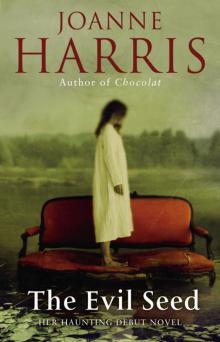 The Evil Seed
The Evil Seed Gentlemen and Players
Gentlemen and Players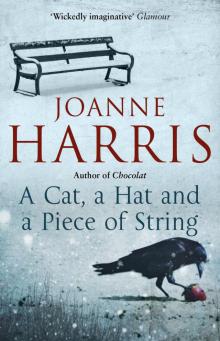 A Cat, a Hat, and a Piece of String
A Cat, a Hat, and a Piece of String Different Class
Different Class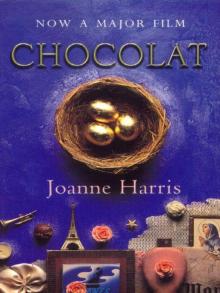 Chocolat
Chocolat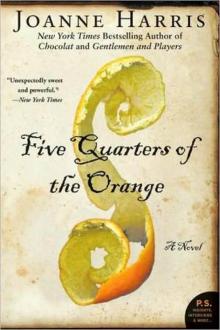 Five Quarters of the Orange: A Novel
Five Quarters of the Orange: A Novel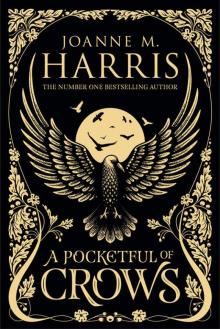 A Pocketful of Crows
A Pocketful of Crows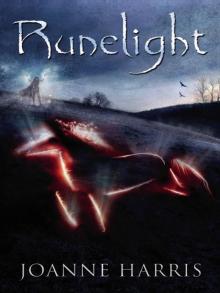 Runelight
Runelight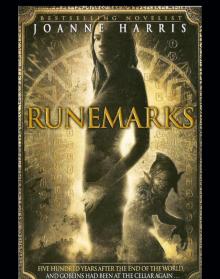 Runemarks
Runemarks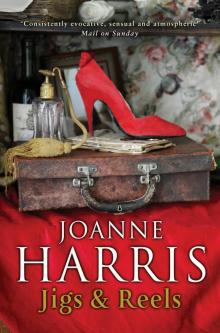 Jigs & Reels: Stories
Jigs & Reels: Stories Sleep, Pale Sister
Sleep, Pale Sister Holy Fools
Holy Fools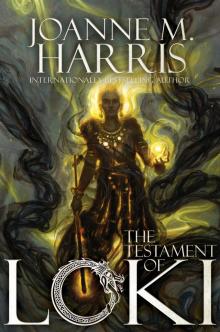 The Testament of Loki
The Testament of Loki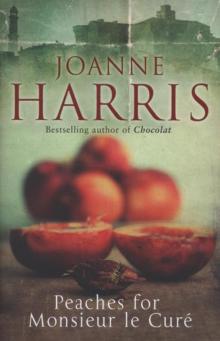 Peaches for Monsieur Le Curé
Peaches for Monsieur Le Curé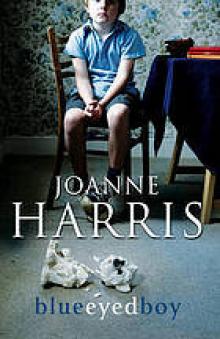 Blueeyedboy
Blueeyedboy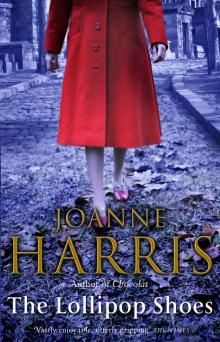 The Lollipop Shoes
The Lollipop Shoes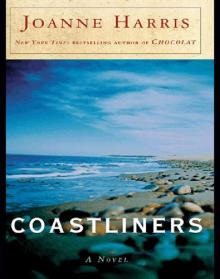 Coastliners
Coastliners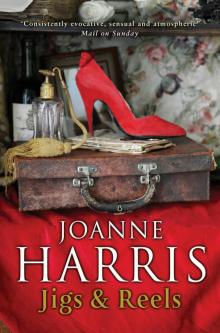 Jigs & Reels
Jigs & Reels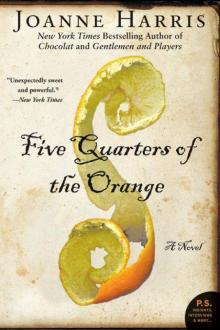 Five Quarters of the Orange
Five Quarters of the Orange